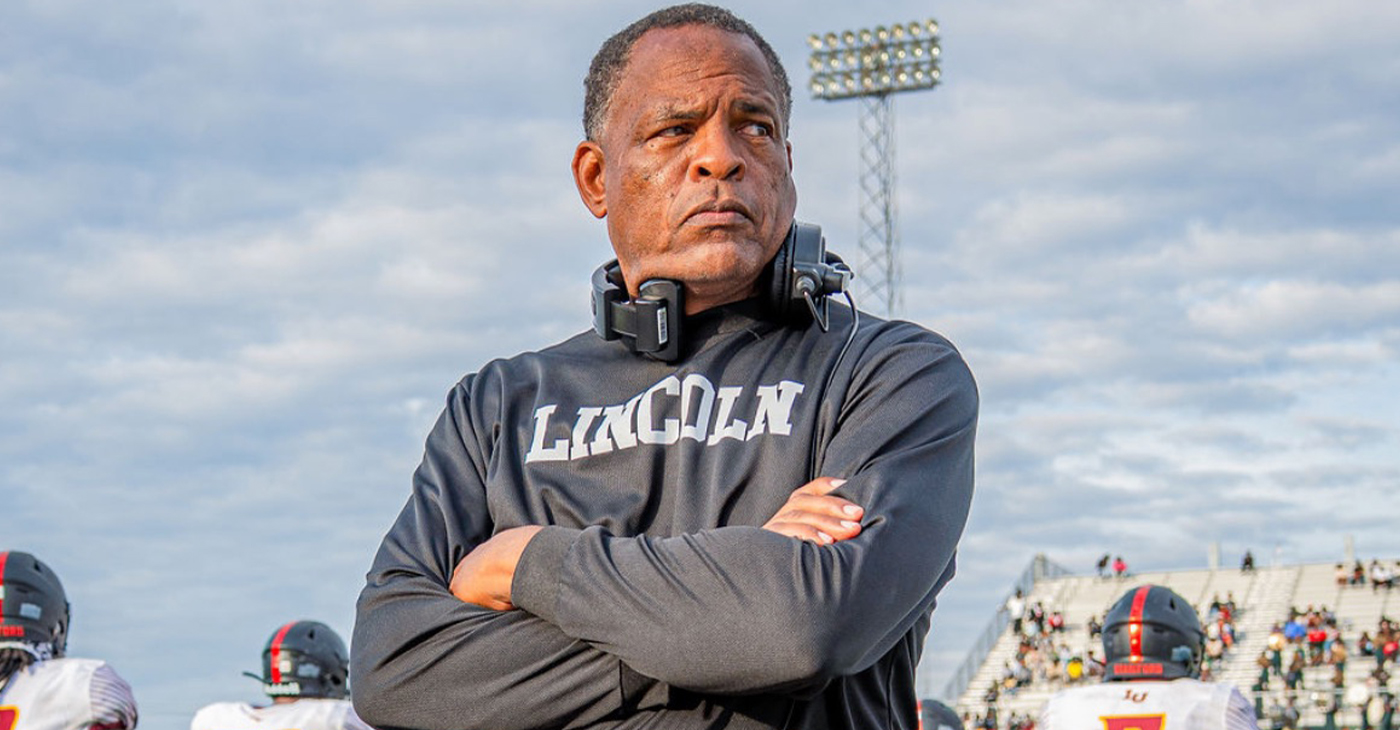Education
Dr. Shawn Joseph Unchained
THE TENNESSEE TRIBUNE — As the highly tumultuous period of leadership for the city’s first African-American Director of Schools for Metro Nashville Public Schools comes to a shameful end, Dr. Shawn Joseph showed class all the way while the city will have to watch and see if the Board of Education will claw the new black Director of Schools.
Published
7 years agoon
By
Oakland Post
By Tribune Staff Writer
NASHVILLE, TN — As the highly tumultuous period of leadership for the city’s first African-American Director of Schools for Metro Nashville Public Schools comes to a shameful end, Dr. Shawn Joseph showed class all the way while the city will have to watch and see if the Board of Education will claw the new black Director of Schools. The city of Nashville was forced to watch the media and some board members driven by personal agendas viscously attack his more than 20-year career, his name, and his character. With such heavy focus on Dr. Joseph, the priorities and educational concerns for the more than 85,000 school children took a backseat. Non-African American reporters worried about the type of music he liked and how he was being transported to his numerous meetings, but failed to report, discipline or fully expose school board members that invoked Klu Klux Klan behavior by recommending that folks wear masks to a meeting to protest this educated Black man.
With grace and professionalism, Dr. Joseph faithfully stood by his impressive and proven track record demonstrating gains in math and reading scores, the creation of new STEAM magnet programs at the elementary level and at 18 middle schools and the establishment of an Early College High School program. Like the first Hispanic Director of Schools, Dr. Pedro Garcia, Dr. Joseph had to wade through school board mess left by previous white male superintendents even though those who felt his leadership was questionable failed to realize there were no complaints about Dr. Joseph ever raised by any of the city’s mayors.
Now that Dr. Joseph can become unchained, he can share his truth. He spoke with The Tennessee Tribune in length and shared insight into several matters of interest to the community providing answers to questions that often went unasked and were severely misreported such as sexual harassment allegations, contracts, that the leaks of confidential information and the infamous request made by a board member encouraging people to come to meetings wearing masks which felt like a modern-day lynching.
Tennessee Tribune (Tribune): “Dr. Joseph, for your supporters and the many residents of Nashville who care for you and respect your leadership, they want to know how you’re doing?”
Dr. Shawn Joseph (SJ): “I definitely want to thank everyone for the support and prayers. I want them to know that I’m doing fine. Prayer does move things. My name is Joseph, and Joseph, was a mighty person that went through some things and the Lord always took care of him.”
Tribune: “The Tribune also saw that you gave a parting quote from the late artist Tupac. How should that expression ‘I ain’t mad at cha’ be interpreted by the board and the community?”
SJ: Prior to that, I was talking about the walk of Jesus, and He teaches us that we have to forgive those that have done us wrong. I wanted the board to know from the bottom of my heart, and genuinely, that I’m not mad at cha. Things happen as they’re supposed to happen and for times, such as these, it was time to part our ways.”
Tribune: “Do you recall the exact moment when things started to go wrong and you thought things may go in a bad direction?”
SJ: “What I would say is that I noticed from the time I came to Nashville, I noticed that people aren’t used to strong African-Americans, particularly male leaders and there aren’t that many in Nashville. From the inception, there has been lots of infatuation with how we did the work, why we did the work and things of that nature. There is also a news group that is also very Jerry Springer-like running around chasing a story and trying to make news when there is no news.”
Tribune: “Are there any job-related moments that caused early shifts in the board members attitudes?”
SJ: “When we began to discuss equity and putting dollars in schools for the neediest kids and when we started making tough decisions as around budget cuts, a few board members begin to change but the majority understood. We couldn’t stay focused and have the needed communication in order to get through some of the tough decisions.”
Tribune: “Would you say this is when the board began their plans to sabotage and discredit you?”
SJ: “I wouldn’t say it was planned in the beginning but over the last year there have been key individuals who had a mission to destroy my reputation and destroy the great work we were doing in order to keep us off focus. With another year and a half on my contract, I didn’t think the city should sit through another year of fighting.”
Tribune: “What did you think you were going to accomplish in Nashville?”
SJ: “I didn’t come here for that. I came to Nashville to improve reading outcomes for kids and achievements for gifted and talented students, see fewer kids getting suspended, helping kids get certifications, adding early colleges and improve ACT scores among many things. We did these things in a short time frame with a strategic plan to connect the school system to the community. There was a disconnect when I got here, and they never saw the superintendent in the community and the schools. We have to love the children we have and not those that we hope come back.”
Tribune: “You were clear when you said you came here to deal with the children and not the adults. What was in your presentation to the board members at your March 26, 2019 State of Schools meeting?
SJ: “This was at our last board meeting where I communicated that it would be beneficial that we come to a mutual agreement and separate. I also communicated that in the areas where people have continuously tried to say I had done something wrong, I needed to present the facts.”
Tribune: “What were those areas?”
SJ: “I needed to be accurate and clear about sexual harassment, contracts, and other issues that kept coming up. Again, you have these Jerry Springer and Geraldo wanna be newscasters who continuously try to present re-runs. With over 800 meetings in the community, how many times are they going to keep talking about the fact that I have a driver? I’ve never been in a place where people are doing audits of audits.”
Tribune: “What is the final point you want the community to know regarding all of the investigations and allegations?”
SJ: “You can’t make something happen that didn’t happen and it’s clear that nothing illegal, immoral or unethical was done as we were simply trying to do the work. If anything, I pushed too hard and too fast with too little resources.”
Tribune: “What about the mistakes”
SJ: “People make mistakes. Moral mistakes, and it’s not what Shawn did because I was responsible for 11,000 employees and a lot of people in the organization made mistakes. As the superintendent, I’m responsible for what happens. It was on my watch and people worked really hard to connect things to me that weren’t connectable.”
Tribune: “Can you provide an example?”
SJ: “There were two people in Human Resources that didn’t report things to the state.”
Tribune: “Who was the person that was tasked to ensuring the reports were made to the state and to the board and were they terminated?”
SJ: “The person was a human resources employee in Human Relations, and we asked him to resign or be terminated? He resigned.”
Tribune: “So you were stuck holding the bag on infractions that should have been reported to the board?”
SJ: “Yes, you could say that.”
Tribune: “What did you actually do as a leadership position amidst the sexual harassment claims?”
SJ: “Unfortunately, bad things happen and the organization must take swift action. The same individual that didn’t turn in paperwork, also had files that contained lots of information and we believe that information was shared with the media and it snowballed into a mess. This was a manufactured crisis that was created.”
Tribune: “Did any sexual harassment issues really happen?”
SJ: “Clearly there were some issues of sexual harassment that happened and each individual was addressed and the situations thoroughly investigated and evaluated.”
Tribune: “But what about instances directly reported to you?”
SJ: “When an employee came to me directly and communicated a concern, at that exact moment while he talked to me, I sent a message to human resources and he was in the human resources office the next morning getting his information investigated. My responsibility is to report it to human resources and then they follow-up.”
Tribune: “Is there a human resources report or audit in writing on the sexual harassment issues?”
SJ: “There was an audit and the information found there was no substance in the issue after an investigation. However, the report showed different processes but not consistency in the process because people do things different ways. It still goes back to having a news channel and school board members trying to connect you to something with no substance. Just pray for them and hope they understand you don’t do people that way.”
Tribune: “If I’m not mistaken, there’s data that shows you spent less money than your predecessor, Jesse Register?”
SJ: “Yes, we spent millions less. Even with the contract issue, we invested in the right product and our children deserved world class products. These are reasons our reading scores in early grades are growing and ACT scores are up because we put the right investments in the right places to get better outcomes for kids.”
Tribune: “Isn’t this what you were hired for?”
SJ: “The original board hired me because I worked in districts that had gotten better results than Nashville public schools. To make an assertion because I know of a certain product is foolish.”
Tribune: “Was any documentation ever provided to show you the data that lead to their conclusions?”
SJ: “The board received a confidential report from the attorneys, and we were supposed to meet, speak to the lawyers and clarify how they came to their conclusions, but instead, the board sent it to the media before we talked to the law firm and the media reported on it. I had a lot of questions about the report that were broad and dangerous.”
Tribune: “How do you feel about the three board members that gave you all the same unsatisfactory marks on your evaluation?”
SJ: “I think there was definitely inconsistency and definite evidence to suggest these scores were lower than they should be. But the evaluation system was weaponized to do bad things and to blame which would make a system not want to use the evaluation tool. The evaluation system failed because the board wasn’t able to properly evaluate the areas for improvement. We need rubrics so people can’t give a one where it should be a four.”
Tribune: “So basically, all of the evaluations were consistent except three which looked as if they did your evaluation while mad, crying and in the dark?”
SJ: “Those are your words, not mine.”
Tribune: “You presented an attractive budget to the board that included pay raises, money for Pre-K and raises for bus drivers.”
SJ: “The budget was conservative at $31 million considering we only received $5 million last year because we didn’t have money as a city. Student and adult needs were balanced but the board doubled the request asking for 10 percent raises for teachers which is historical. I wouldn’t place the funding for children against adults and now the budget has to be approved by the Mayor and they will have to take the budget they recommend.”
Tribune: “Were the children neglected while so much was being done in this Dr. Joseph witch hunt?”
SJ: “A majority of the board members tried to do the right things. Dr. Sharon Gentry,is an excellent President and Will Pinkston was a strong advocate for the children. Only a few were not focused so the children were not neglected.”
Tribune: “Like cancer, if these board members are not removed what is the difference between you and the new minority leader and so they won’t do this to her?”
SJ: “I don’t know. I hope this board rallies around Dr. Battle so that she can focus on our kids.”
Tribune: “Could the Mayor’s office have provided more support, or did they come too late?”
SJ: “I appreciate David Briley. He cares about the city and about the kids. He’s running for election and you have to be thoughtful about the political environment that you’re in. Ultimately he came out and did the right thing and said we need to focus on our kids.”
Tribune: “What do you think about Vice Mayor Shulman being on the forefront initially and the Mayor didn’t come forth until the heat turned up?
SJ: “I don’t have an opinion on that.”
Tribune: Well, do you have an opinion on what the disadvantaged citizens who don’’t have the platform you do are suppsed to do?
SJ: “This is a moment to become more unchained and begin to be more socially active and use our voices to advocate on behalf of our children and ourselves.”
Tribune: “At one point, two people on the board called you vindictive and tried to get scared teachers to show up like the Ku Klux Klan by hiding their faces in masks?”
SJ: “One of the things that disturbed me the most was the fact the board member referenced masks.”
Tribune: “In 2019, this is more than wearing a mask because with number 45 in the office this goes straight to the KKK.”
SJ: “Her lack of humility and sensitivity did not lead her to apologize for the anger and hurt she caused to the community as she shrugged us off like our feelings didn’t matter. This sent a message that we didn’t have a huge outcry from the entire community.
Tribune: “So in 2019 she basically encourages the cowards to come out with the torches wearing a mask? Anybody that encourages that type of behavior is wrapped in racism.
SJ: “I don’t know because I never imagined having that experience here in Nashville. There’s a way to do things and that definitely wasn’t it.”
Tribune: “If they had shown up in masks and all would you have prayed to Jesus and said forgive me for I know not what they do? Would you have remained calm?”
SJ: “My fraternity taught me, that we’re not afraid. It takes a whole lot to scare Shawn Joseph or make me jump.”
Tribune: “You know the Bible and like John the Baptist, these people wanted your head on a platter, but they didn’t come to see it cut off.”
SJ: It’s our job to model civility and show people what right looks like. I am now free to be more outspoken since I’m no longer the superintendent but there is still a God inside of us and we have to model manhood, scholarship and perseverance.”
Tribune: “Seeing a face like yours in the school system in your position gives young black boys goals. When you leave there will be a huge deficit.”
SJ: “I was able to reduce the school suspensions significantly among black males. Kids experience a lot of stress due to disparities and this must continue to be addressed.”
Tribune: “Since you’re no longer the superintendent, what happens when you have to engage with one of the former board members?”
SJ: “I’ll treat them as people and be courteous. These aren’t my friends, so I don’t have to do a lot of talking. The focus is on the kids, always.”
Tribune: “You’re going to, of course, land on your feet. What’s next on the horizon?”
SJ: “I will definitely stay in education. Look for me on April 28th at 1 pm on WQQK-FM 92.1 radio station. I’m finalizing some things and hope to give updates on where I am in my thinking. I will continue to be an advocate for schools, families and parents.”
Dr. Shawn Joseph wishes everyone in Nashville well. He has plans to continue helping the kids of Nashville become future leaders and changemakers. He looks forward to staying in touch on numerous social media platforms and can be reached on Twitter @UnchainedJoseph.
Editor’s Note: Tribune readers may also learn more about the progress of supporting children in Nashville by following these social media sites as well: Facebook @supportnashvillechildren; Twitter @supportnashkids; and Instagram @supportnashvillekids.
This article originally appeared in The Tennessee Tribune.
Oakland Post
You may like
-


NFL Commissioner Roger Goodell: Nashville is a ‘Super-Bowl Ready City’
-


Black Blood, American Freedom: How the Civil Rights Movement Protected All Races
-


Titans and QB Cam Ward are dedicated to two ideals: Growth and Development
-


A Question of Lynching in Mississippi
-


Federal Cuts Strip $350 Million From HBCUs and Minority-Serving Institutions
-


The Violence Trump Claims to Fear Occurs Mostly in Red States
Arts and Culture
Book Review: Books on Black History and Black Life for Kids
For the youngest reader, “As You Are: A Hope for Black Sons” by Kimberly A. Gordon Biddle, illustrated by David Wilkerson (Magination Press, $18.99) is a book for young Black boys and for their mothers. It’s a hope inside a prayer that the world treats a child gently, and it could make a great baby shower gift.
Published
3 weeks agoon
February 10, 2026By
Oakland Post
By Terri Schlichenmeyer
Authors: Various, Copyright: c. 2025, 2026, Publishers: Various, SRPs: $17.99-$18.99, Page Counts: Various,
Everybody in your family has stories to share.
Your parents have told you some, no doubt. Your grandparents have offered a few, too, and aunties and uncles have spun some good tales. But there’s so much more to know, so grab one of these great books and learn about Black History and Black life.
For the youngest reader, “As You Are: A Hope for Black Sons” by Kimberly A. Gordon Biddle, illustrated by David Wilkerson (Magination Press, $18.99) is a book for young Black boys and for their mothers. It’s a hope inside a prayer that the world treats a child gently, and it could make a great baby shower gift.
If someone said you couldn’t do something that you were clearly able to do, would you fight to do it anyhow? In the new book, “Remember Her Name! Debbie Allen’s Rise to Fame” by Tami Charles, illustrated by Meredith Lucius (Charlesbridge, $17.99), a young girl in the Jim Crow South is told that she can’t dance because of the color of her skin.
She didn’t listen, though, and neither did her mother, who took her daughter to Mexico, where the girl soared! This is an inspiration for any 5-to-7-year-old; be sure to check out the back-of-the-book information, if you’re an adult fan.
Do you often hear your elders say things that sound like lessons? They might be, so “Where There is Love: A Story of African Proverbs” by Shauntay Grant, illustrated by Leticia Moreno (Penguin Workshop, $18.99) is a book you’ll like. It’s a quick-to-read collection of short proverbs that you can say every day. Kids ages 4-to-6 will easily remember what they find in this book; again, look in the back for more information.
Surely, you love your neighborhood, which is why the tale inside “Main Street: A Community Story about Redlining” by Britt Hawthorne and Tiffany Jewell, illustrated by David Wilkerson (Penguin Kokila, $18.99) is a book for you.
Olivia’s neighborhood is having a block party, but she’s sad when no one shows up. That’s when she learns that “the government” is discriminating against the people and businesses near where she lives. So, what can she and her neighbors do? The answer might inspire 6-to-8-year-old kids to stand up to wrongs they see, and to help make their neighborhoods stronger and safer.
And finally, if a kid wants a book, where can they go to find it? In “I’m So Happy You’re Here: A Celebration of Library Joy” by Mychal Threets, illustrated by Lorraine Nam (Random House, $18.99) is a good introduction to the best of what a library has to offer. The freedom to walk into a library and borrow a book is the theme here, as is the sheer happiness of being welcomed, no matter who you are. This is an easy book for kids as young as two and as old as five to enjoy.
On that note, if you want more, head to that library, or a nearby bookstore. They’ll be glad to see you. They’ve got stories to share.
Oakland Post
#NNPA BlackPress
Why Black Parents Should Consider Montessori
BLACKPRESSUSA NEWSWIRE — I have found that there are some educational approaches that consistently provide a safer, more enriching, and more affirmative environment for Black children. The Montessori method, developed by Italian physician Maria Montessori and introduced to the U.S. in the early 20th century, is one such approach.
Published
3 weeks agoon
February 9, 2026By
Oakland Post
As a mother of four children, I’ve done A LOT of school shopping. I don’t mean the autumn ritual of purchasing school supplies. I mean shopping for schools – pouring over promotional materials, combing through websites, asking friends and community members for referrals to their favorite schools, attending open houses and orientations, comparing curriculums and educational philosophies, meeting teachers and principals, and students who all claim that their school is the best.
But keep in mind – I’m not just a mom of four children. I’m a mom of four Black children, and I’m also a psychologist who is very interested in protecting my little ones from the traumatic experience that school can too often become.
For Black children in the United States, school can sometimes feel more like a prison than an educational institution. Research shows that Black students experience school as more hostile and demoralizing than other students do, that they are disciplined more frequently and more harshly for typical childhood offenses (such as running in the halls or chewing gum in class), that they are often labeled as deviant or viewed as deficient more quickly than other children, that teachers have lower academic expectations of Black students (which, in turn, lowers those students’ expectations of themselves), and that Black parents feel less respected and less engaged by their children’s teachers and school administrators. Perhaps these are some of the underlying reasons that Black students tend to underperform in most schools across the country.
The truth is that schools are more than academic institutions. They are places where children go to gain a sense of who they are, how they relate to others, and where they fit into the world. The best schools are places that answer these questions positively – ‘you are a valuable human being, you are a person who will grow up to contribute great things to your community, and you belong here, with us, exploring the world and learning how to use your gifts.’ Unfortunately, Black children looking for answers to these universal questions of childhood will often hit a brick wall once they walk into the classroom. If the curriculum does not reflect their cultural experiences, the teachers don’t appear to value them, and they spend most of their time being shamed into compliance rather than guided towards their highest potential, well…what can we really expect? How are they supposed to master basic academic skills if their spirits have been crushed?
Here’s the good news. In my years of school shopping, and in the research of Black education specialists such as Jawanza Kunjufu and Amos Wilson, I have found that there are some educational approaches that consistently provide a safer, more enriching, and more affirmative environment for Black children. The Montessori method, developed by Italian physician Maria Montessori and introduced to the U.S. in the early 20th century, is one such approach.
The key feature of Montessori schooling is that children decide (for the most part) what they want to do each day. Led by their own interests and skill levels, children in a Montessori classroom move around freely and work independently or with others on tasks of their own
choosing. The classroom is intentionally stocked with materials tailored to the developmental needs of children, including the need to learn through different senses (sight, touch/texture, movement, etc.). The teacher in a Montessori classroom is less like a boss and more like a caring guide who works with each child individually, demonstrating various activities and then giving them space to try it on their own. The idea is that over time, students learn to master even the toughest tasks and concepts, and they feel an intense sense of pride and accomplishment because they did it by themselves, without pressure or pushing.
I think that this aspect of the Montessori method is good for all kids. Do you remember the feeling of having your creativity or motivation crushed by being told exactly what to do, when to do it, how to do it, and why? The truth is that when presented with a new challenge and then given space, children actually accomplish a lot! They are born with a natural desire to learn. It is that spirit of curiosity, sense of wonder, and excitement to explore that Montessori helps to keep alive in a child. But that’s not the only reason that I think Black parents need to consider Montessori.
Fostering a love of learning is great. But more importantly, I think that Montessori students excel at learning to love. It begins with Montessori’s acknowledgement that all children are precious because childhood is a precious time. In many school systems, Black children are treated like miniature adults (at best) or miniature criminals (at worst), and are subjected to stressful situations that no kids are equipped to handle – expectations to be still and silent for long periods, competitive and high-stakes testing, and punitive classroom discipline. It’s easy to get the sense that rather than being prepared for college or careers, our children are being prepared to fail. Couple this with the aforementioned bias against Black children that seems to run rampant within the U.S. school system, and you end up with children who feel burned out and bitter about school by the time they hit 3rd grade.
In my experience, Montessori does a better job of protecting the space that is childhood – and all the joy of discovery and learning that should come along with that. Without the requirement that students “sit down and shut up,” behavioral issues in Montessori classrooms tend to be non-existent (or at least, the Montessori method doesn’t harp on them; children are gently redirected rather than shamed in front of the class). Montessori students don’t learn for the sake of tests; they demonstrate what they’ve learned by sharing with their teacher or classmates how they solve real-world problems using the skills they’ve gained through reading, math, or science activities. And by allowing children a choice of what to focus on throughout the day, Montessori teachers demonstrate that they honor and trust children’s natural intelligence. The individualized, careful attention they provide indicates to children that they are each seen, heard, and valued for who they are, and who they might become. Now that’s love (and good education).
As a parent, I’ve come to realize that many schools offer high-quality academics. Montessori is no different. Students in Montessori schools gain exposure to advanced concepts and the materials to work with these concepts hands-on. Across the nation, Montessori schools emphasize early literacy development, an especially important indicator of life success for young Black boys and men. Montessori students are provided with the opportunity to be
successful every day, and the chance to develop a sense of competence and self-worth based on completing tasks at their own pace.
But I have also learned that the important questions to ask when school shopping are often not about academics at all. I now ask, ‘Will my children be treated kindly? Will they be listened to? Protected from bias and bullying? Will they feel safe? Will this precious time in their lives be honored as a space for growth, development, awe, and excitement? Will they get to see people like them included in the curriculum? Will they be seen as valuable even if they don’t always ‘measure up’ to other kids on a task? Will they get extra support if they need it? Will the school include me in major decisions? Will the school leaders help to make sure that my children reach their fullest potential? Will the teacher care about my children almost as much as I do?’
Consistently, it’s been the Montessori schools that have answered with a loud, resounding ‘Yes!’ That is why my children ended up in Montessori schools, and I couldn’t be happier with that decision. If you’re a parent like me, shopping for schools with the same questions in mind, I’d urge you to consider Montessori education as a viable option for your precious little ones. Today more than ever, getting it right for our children is priceless.
Oakland Post
Activism
Desmond Gumbs — Visionary Founder, Mentor, and Builder of Opportunity
Gumbs’ coaching and leadership journey spans from Bishop O’Dowd High School, Oakland High School, Stellar Prep High School. Over the decades, hundreds of his students have gone on to college, earning academic and athletic scholarships and developing life skills that extend well beyond sports.
Published
2 months agoon
December 20, 2025By
Oakland Post
Special to the Post
For more than 25 years, Desmond Gumbs has been a cornerstone of Bay Area education and athletics — not simply as a coach, but as a mentor, founder, and architect of opportunity. While recent media narratives have focused narrowly on challenges, they fail to capture the far more important truth: Gumbs’ life’s work has been dedicated to building pathways to college, character, and long-term success for hundreds of young people.
A Career Defined by Impact
Gumbs’ coaching and leadership journey spans from Bishop O’Dowd High School, Oakland High School, Stellar Prep High School. Over the decades, hundreds of his students have gone on to college, earning academic and athletic scholarships and developing life skills that extend well beyond sports.
One of his most enduring contributions is his role as founder of Stellar Prep High School, a non-traditional, mission-driven institution created to serve students who needed additional structure, belief, and opportunity. Through Stellar Prep numerous students have advanced to college — many with scholarships — demonstrating Gumbs’ deep commitment to education as the foundation for athletic and personal success.

NCAA football history was made this year when Head Coach from
Mississippi Valley State, Terrell Buckley and Head Coach Desmond
Gumbs both had starting kickers that were women. This picture was
taken after the game.
A Personal Testament to the Mission: Addison Gumbs
Perhaps no example better reflects Desmond Gumbs’ philosophy than the journey of his son, Addison Gumbs. Addison became an Army All-American, one of the highest honors in high school football — and notably, the last Army All-Americans produced by the Bay Area, alongside Najee Harris.
Both young men went on to compete at the highest levels of college football — Addison Gumbs at the University of Oklahoma, and Najee Harris at the University of Alabama — representing the Bay Area on a national level.
Building Lincoln University Athletics From the Ground Up
In 2021, Gumbs accepted one of the most difficult challenges in college athletics: launching an entire athletics department at Lincoln University in Oakland from scratch. With no established infrastructure, limited facilities, and eventually the loss of key financial aid resources, he nonetheless built opportunities where none existed.
Under his leadership, Lincoln University introduced:
- Football
- Men’s and Women’s Basketball
- Men’s and Women’s Soccer
Operating as an independent program with no capital and no conference safety net, Gumbs was forced to innovate — finding ways to sustain teams, schedule competition, and keep student-athletes enrolled and progressing toward degrees. The work was never about comfort; it was about access.
Voices That Reflect His Impact
Desmond Gumbs’ philosophy has been consistently reflected in his own published words:
- “if you have an idea, you’re 75% there the remaining 25% is actually doing it.”
- “This generation doesn’t respect the title — they respect the person.”
- “Greatness is a habit, not a moment.”
Former players and community members have echoed similar sentiments in public commentary, crediting Gumbs with teaching them leadership, accountability, confidence, and belief in themselves — lessons that outlast any single season.
Context Matters More Than Headlines
Recent articles critical of Lincoln University athletics focus on logistical and financial hardships while ignoring the reality of building a new program with limited resources in one of the most expensive regions in the country. Such narratives are ultimately harmful and incomplete, failing to recognize the courage it takes to create opportunity instead of walking away when conditions are difficult.
The real story is not about early struggles — it is about vision, resilience, and service.
A Legacy That Endures
From founding Stellar PREP High School, to sending hundreds of students to college, to producing elite athletes like Addison Gumbs, to launching Lincoln University athletics, Desmond Gumbs’ legacy is one of belief in young people and relentless commitment to opportunity.
His work cannot be reduced to headlines or records. It lives on in degrees earned, scholarships secured, leaders developed, and futures changed — across the Bay Area and beyond.
Oakland Post
SEARCH POST NEWS GROUP
CHECK OUT THE LATEST ISSUE OF THE OAKLAND POST

ADVERTISEMENT
WORK FROM HOME
Home-based business with potential monthly income of $10K+ per month. A proven training system and website provided to maximize business effectiveness. Perfect job to earn side and primary income. Contact Lynne for more details: Lynne4npusa@gmail.com 800-334-0540


Poll Shows Support for Policies That Help Families Afford Child Care

Oakland Post: Week of February 25 – March 3, 2026

Trump’s MAGA Allies are Creating Executive Order Plan to Steal the 2026 Midterms

PRESS ROOM: NBA Hall of Fame Nominee Terry Cummings Joins 100 Black Men of DeKalb County to Launch Victory & Values Initiative

Reflecting on Black History Milestones in Birmingham AL

OP-ED: One Hundred Years of Black Workers Telling the Truth

PRESS ROOM: Civil Rights TV Launches in Selma as the World’s First 24/7 Civil Rights Television Network

Advancements in solar technology that are changing the way we power the world

U.S. manufacturing rebounds – how foundry services are adapting to rising demand

Why has blood testing become so popular in today’s world?

Ghana Mourns a Son of the African World

OP-ED: Trump’s Policies Hurt Black America—and Everyone Else

OP-ED: Meta Deleted Me. I Still Don’t Know Why. And neither will you.

More than a Mission: Paying It Forward for the Future of Education

Avoid Eviction This Season: Landlord Checklist for Stable Tenancies

Life Expectancy in Marin City, a Black Community, Is 15-17 Years Less than the Rest of Marin County

Oakland Post: Week of January 28, 2025 – February 3, 2026

Community Celebrates Turner Group Construction Company as Collins Drive Becomes Turner Group Drive

California Launches Study on Mileage Tax to Potentially Replace Gas Tax as Republicans Push Back

Discrimination in City Contracts

Oakland Post: Week of January 21 – 27, 2026

Book Review: Books on Black History and Black Life for Kids

COMMENTARY: The Biases We Don’t See — Preventing AI-Driven Inequality in Health Care

Medi-Cal Cares for You and Your Baby Every Step of the Way

Post Newspaper Invites NNPA to Join Nationwide Probate Reform Initiative

After Don Lemon’s Arrest, Black Officials Raise Concerns About Independent Black Media

COMMENTARY: The National Protest Must Be Accompanied with Our Votes

Black History Events in the East Bay

Art of the African Diaspora Celebrates Legacy and Community at Richmond Art Center

OP-ED: The Dream Cannot be Realized Without Financial Freedom

Hyundai Ioniq 5 Parking, Safety, and 360 View #shorts

2025 Ioniq 5 New Wiper & Powerful Performance! #shorts

Electric SUV Range: Is 259 Miles Enough? #shorts

EV Charging: How Fast Can You Charge an Electric Vehicle? #shorts

Biometric Cooling… Messaging Seats…Come on! 2025 Infiniti QX80 Autograph 4WD

Charged Up: Witness the Magic of a Fully Electric Car! #shorts

Range Rover Sport PHEV Included…: See What’s Inside This Luxury SUV! #shorts

Invisible Hood View: Perfect Parking with X-Ray Vision! #shorts

AI Is Reshaping Black Healthcare: Promise, Peril, and the Push for Improved Results in California

ESSAY: Technology and Medicine, a Primary Care Point of View

Sanctuary Cities

The RESISTANCE – FREEDOM NOW

STATE OF THE PEOPLE: Freddie

ECONOMIC BOYCOTT DAY!!!!!

I told You So
Trending
-

 Activism4 weeks ago
Activism4 weeks agoLife Expectancy in Marin City, a Black Community, Is 15-17 Years Less than the Rest of Marin County
-

 Activism4 weeks ago
Activism4 weeks agoOakland Post: Week of January 28, 2025 – February 3, 2026
-

 Activism3 weeks ago
Activism3 weeks agoCommunity Celebrates Turner Group Construction Company as Collins Drive Becomes Turner Group Drive
-

 Business3 weeks ago
Business3 weeks agoCalifornia Launches Study on Mileage Tax to Potentially Replace Gas Tax as Republicans Push Back
-

 Activism3 weeks ago
Activism3 weeks agoDiscrimination in City Contracts
-

 Arts and Culture3 weeks ago
Arts and Culture3 weeks agoBook Review: Books on Black History and Black Life for Kids
-

 Activism3 weeks ago
Activism3 weeks agoCOMMENTARY: The Biases We Don’t See — Preventing AI-Driven Inequality in Health Care
-

 Activism4 weeks ago
Activism4 weeks agoMedi-Cal Cares for You and Your Baby Every Step of the Way





